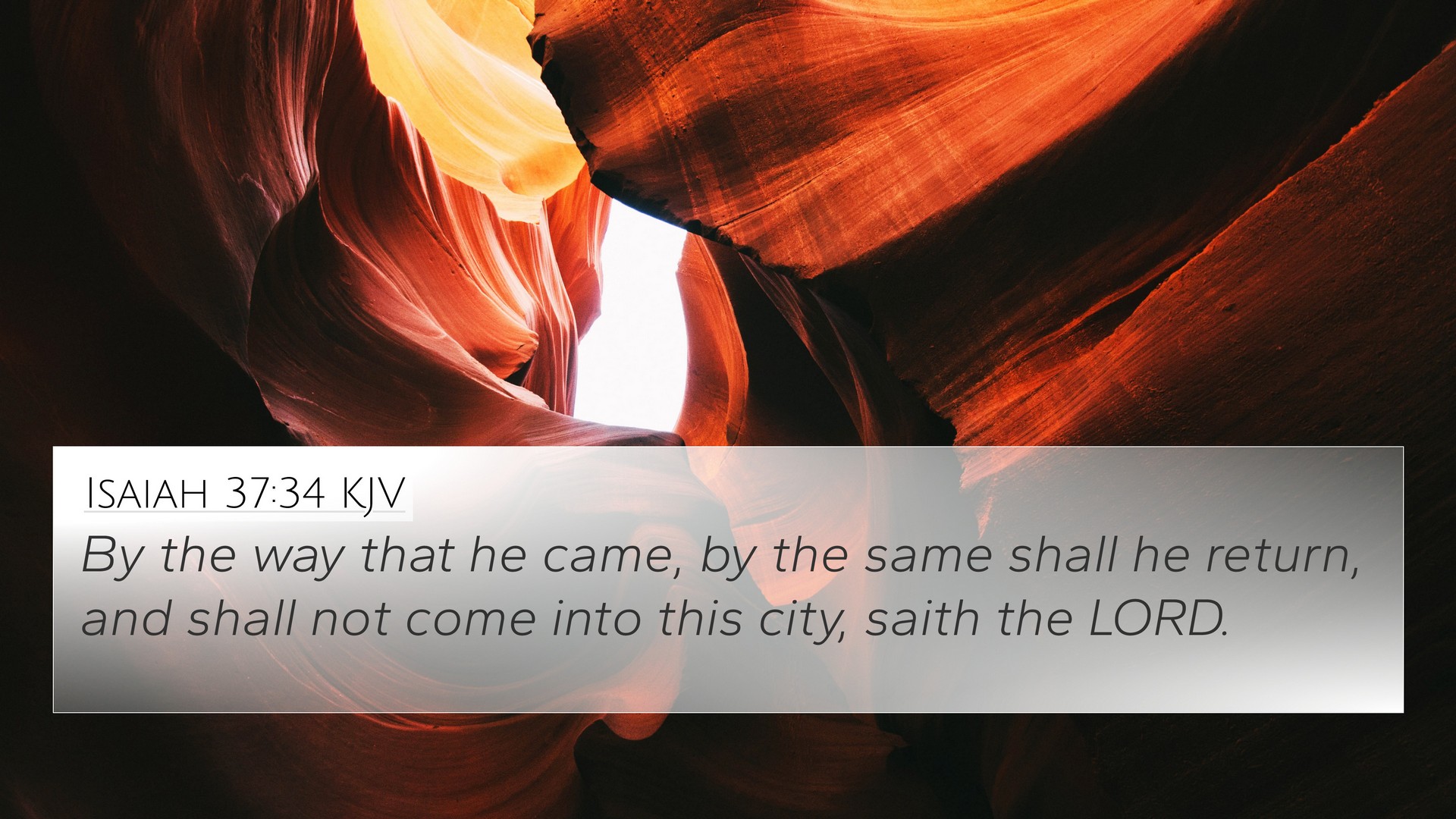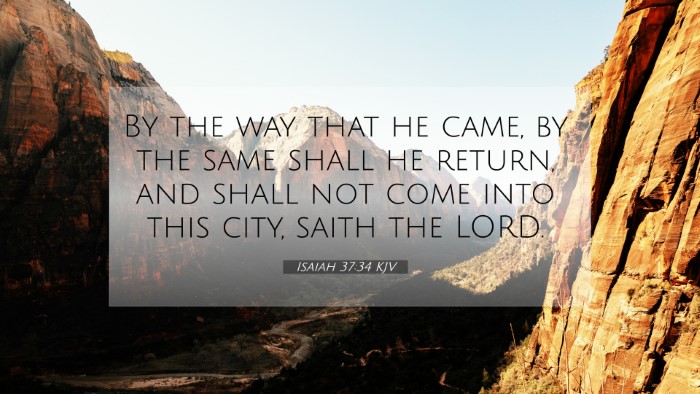Understanding Isaiah 37:34
Isaiah 37:34: "By the way that he came, by the same shall he return; and shall not come into this city, saith the LORD."
This verse occurs in the context of God's message to King Hezekiah concerning the threat posed by the King of Assyria, Sennacherib. The passage highlights God's promise of protection to Jerusalem and serves as a powerful affirmation of divine sovereignty over the nations.
Verse Meaning and Interpretation
The meanings derived from public domain commentaries reveal several profound insights into the verse:
- Matthew Henry: Henry emphasizes the certainty of God's promise, indicating that Sennacherib's return will mirror his approach, symbolizing God's control over the affairs of men. He also points out that Sennacherib will not enter Jerusalem, highlighting God's protective hedge around the city.
- Albert Barnes: Barnes elaborates on the implications of the Lord's assurance, stressing the idea of divine retribution. The Assyrian king’s arrogance is contrasted with God's ultimate authority, reinforcing the message that wickedness cannot prosper in the sight of Almighty God.
- Adam Clarke: Clarke notes the historical context, reflecting on how this prophecy was fulfilled. He discusses the significance of Sennacherib being thwarted in his plans, showcasing God's faithfulness to His covenant people and His desire to preserve Jerusalem from destruction.
Thematic Connections and Cross-References
This verse can be connected to various other Biblical texts, forming a web of themes consistent with God's protection and faithfulness. Here are 10 key Bible verse cross-references:
- 2 Kings 19:7: God's assurance to Hezekiah that Sennacherib would fall to the sword.
- Psalms 34:7: The angel of the Lord encamps around those who fear Him, providing protection.
- Psalms 125:1-2: Assurance of God’s protection for those who trust in Him, like Mount Zion cannot be moved.
- Isaiah 31:5: As birds flying, so will the Lord defend Jerusalem.
- Isaiah 36:10: The Assyrian's assumption of victory over Jerusalem is called into question.
- Isaiah 34:2: The judgment against the nations, indicating God's control over all armies.
- Exodus 14:14: "The Lord will fight for you, and you shall hold your peace," resonating with Hezekiah's situation.
- Romans 8:31: "If God is for us, who can be against us?" linking to divine protection.
- Proverbs 21:30: No wisdom, no understanding, and no counsel can prevail against the Lord.
- Philippians 1:28: Encouragement not to be frightened in anything by opponents, akin to Hezekiah’s reassurance.
Practical Application and Study Reflections
For believers today, Isaiah 37:34 serves as a reminder of God's sovereignty and protection. When faced with threats—whether physical, emotional, or spiritual—the assurance that God safeguards His people remains a crucial part of faith.
In studying this verse and its cross-references, we can appreciate the interconnected narratives throughout Scripture. The act of Bible cross-referencing helps illuminate deeper meanings and themes found within God's revelations. Utilizing tools such as a Bible concordance or a cross-reference guide can significantly enhance one's understanding and interpretation of biblical truths.
Conclusion
Isaiah 37:34 stands as a testimony to the Lord's power and faithful governance over His people. By analyzing this verse and noting its connections with other scripture, one can see a comprehensive understanding of divine intervention. This verse invites believers to trust in the Lord's plans, offering hope amidst adversity, and strengthening the bonds of faith through scriptural cross-referencing.
The practice of cross-referencing Bible study not only fosters a richer communion with God's Word but also equips believers with the knowledge necessary to encourage others in their spiritual journeys. Engaging in this method cultivates a profound gratitude for the cohesive narrative of the Bible, weaving together themes of hope, protection, and divine authority.




